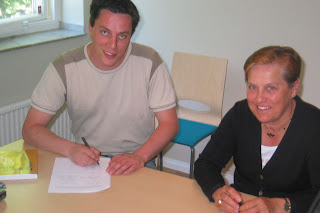 07 conference in the Autum. Issues in his work are children with ASD or Asperges syndrome that have a life in mainstreamschools, where they act differently than the other pupils and have to manage that somehow. It is a central issue in caretaking of children and teenagers with ASD.
07 conference in the Autum. Issues in his work are children with ASD or Asperges syndrome that have a life in mainstreamschools, where they act differently than the other pupils and have to manage that somehow. It is a central issue in caretaking of children and teenagers with ASD.
But before Joseph Mintz started teaching and researching at LSBU, he had a carrier in the IT-industri, which in this project can be of great value.
Before going to London we had several negotiations.Firstly I had asked Egebakken, if one member from the management could participate. I did so, because I emphazise teachers experience very much. Their knowledge, experiences, and competences should have a central and large role in the HANDS project. If we had the opportunity to visit a school in GB it would be nice. Informationofficer Susan Guldstad was asked to participate and it was a good choice. She is eager to push the project forward, openminded and critical. And as an surplus value she is taking an NLP-education and is always in a good mood.
Secondly while I started negotiation with Joseph, it happened that his father had a very larger operation and Joseph's time and attention was neded there. I must admit, I was pushy and Joseph managed to handle both his father and planning a very large and interesting program for Susan and me.
We had one day together at LSBU together with interesting and qualified staffmembers. We meet
- Peter Winbourne, reader in Mathematics Education
- Caty March, Senior Lecturer in Professional Studies,and a teacher with considerable experience in working with children with ASD
- Xristine Faulkner, Reader in Human Computer Interaction(I have used her books in my own teaching!!)
- Julia Power, European Programmes Manager at LSBU
- and finally Sally Inman, Head of Department
The invited people represented very different views on ICT and ASD which made it valuable and interesting. Through the talks we had to explain and argue for the HANDS project in a new manner.
- Research methodology
- The term "Social inclusion"
According to Research Methodology we tried to elaborate a methodology based on a combination of qualitativeve dataand quantitative data. We tried, but - I believe - we agreed, that the terms in Persuasive Technology and the intention of the project had to be proved first and it limited our debate to a vague conclusion that HANDS should rather be considered to be several qualitative experiments. This was the first argument. The second argument was - that our empirical data will not form a massive amount of quantitative data, (rather the opposite due to the fact, that the phenomena we will observe is behaviors of teenagers with ASD) which makes it possible to make clear and simple verification of HANDS software.
From the applications point of view it is fully acceptable. FP7-challenge 7 objective 2 states, applications should be considered to be Proof-of-Concept projects.Furthermore it was noted by Joseph and I, that the HANDS project allow space for a new (in ASD research) type of methodtriangulation: the classical data is some kind of observation by researcher. In the HANDS project we have a very unique source of data: the uninterpretated logfiles which is a registration of the actual use of the HANDS software.
The term social inclusion played an important role in the design of schooloffers to the children with ASD in GB. The politicians in GB wants more children with ASD to attend mainstreamschools and the term social inclusion of young marginalized people from the EU-FP7 challenge 7 objective is in GB context interpreted to be a support of that intention.
The clear preproject conclusion was, that more testsiteschools should be mainstreamschools integrating children with ASD.
After this long and interesting day we finalized the talks with the head of department, Sallyre Inman. She warned us in believing that good EU-proposals always areaccepted. I believe she is right.
LSBU gave two valuable offers more:
- Julia Power offered to read the proposal through before uploading to ESSP
- Xristine Faulkner offered to make an evaluation of the userinterface of HANDS.
The day at LSBU together with Joseph and his colleageus was indeed a valuable day.
Joseph promised to send the "Letter of Intent".







